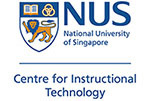CIT is coordinating with the Faculties of Arts and Social Sciences, Engineering, Science and the School of Computing to redesign and reconfigure about 35 seminars rooms into active learning seminar rooms to support NUS’ technology-enhanced learning strategy.
Tag Archives: science
Advancing Science through Conversations: Bridging the Gap between Blogs and the Academy
Siva highlighted this post in Scienceblogs.com, which features a short paper about science blogging that focuses on outreach. It was published under a Creative Commons Attribution license, so I have reproduced it in its entirety here:
Citation: Batts SA, Anthis NJ, Smith TC (2008) Advancing Science through Conversations: Bridging the Gap between Blogs and the Academy. PLoS Biol 6(9): e240 doi:10.1371/journal.pbio.0060240
Published: September 23, 2008
Copyright: © 2008 Batts et al. This is an open-access article distributed under the terms of the Creative Commons Attribution License, which permits unrestricted use, distribution, and reproduction in any medium, provided the original author and source are credited.
Shelley A. Batts is in the Neuroscience Program and Kresge Hearing Research Institute, University of Michigan, Ann Arbor, Michigan, United States of America. Nicholas J. Anthis is in the Department of Biochemistry, University of Oxford, Oxford, United Kingdom. Tara C. Smith is in the Department of Epidemiology, University of Iowa, Iowa City, Iowa, United States of America.
* To whom correspondence should be addressed. E-mail: shelleba@umich.edu
Scientific discovery occurs in the lab one experiment at a time, but science itself moves forward based on a series of ongoing conversations, from a Nobel Prize winner's acceptance speech to collegial chats at a pub. When these conversations flow into the mainstream, they nurture the development of an informed public who understand the value of funding basic research and making evidence-based voting decisions. It is in the interests of scientists and academic institutions alike to bring these conversations into the public sphere.
Do Science students want eLearning Week?

Xinyu, a student taking ES2007S Professional Communication, ruminates about potential research topics. She is aware of the inaugural eLearning Week at the Communications & New Media Programme earlier this year. So, her proposed question is:
Do students in Science Faculty at NUS support the introduction of an eLearning week to its curriculum?
The objective of my study is to determine if a majority of students in the Science Faculty support introduction of eLearning week. My aim will also be to present a report on the responses of the students in Science Faculty at NUS towards introduction of the eLearning week, to curriculum administrators in NUS science course.
My colleagues and I at the Centre for Instructional Technology would love to know the answer to that question! And if it is a 'yes', it will be both exciting and daunting for us. We started small with CNM, so ramping up eLearning Week for an entire faculty would be a challenge. Nevertheless, it is a challenge that we look forward to, if it comes to pass.
I would imagine that a full-scale eLearning Week would necessitate very simple tools. An issue we grappled with in terms of the technology being used is that in a real life situation, a forced eLearning situation might come very suddenly. With no time to prepare, we have to fall back on what we are familiar with. Faculty staff will not have time to learn new techniques/tools (some of which have a significant learning curve). The same goes with students. For example, virtual classroom solutions which we tried on a small scale may not ramp up well.
From my understanding eLearning Week in other institutions involves mostly uploaded lecture slides, with or without accompanying narration, in place of physical lectures. Tutorials are replaced with discussion forums or text chat.
I seem to be getting ahead of myself. Xinyu, if you read this and you decide on this research topic, do let us know your findings. =)

